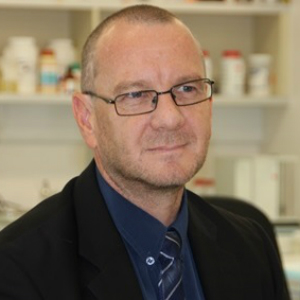
Career progression
1. Pharmacology BSc(Hons), University of Melbourne
2. PhD, Department of Medicine, Austin Hospital
3. Postdoctoral fellowship, Australian Research Council at St. Vincent's Institute of Medical Research
4. Academic research fellow, Department of Pharmacology, University of Melbourne
5. Academic research fellow, Howard Florey Institute Melbourne
6. Professorial fellow, Monash University
7. Head of Department of the Drug Discovery Biology Monash Institute of Pharmaceutical Sciences (MIPS)
8. Theme Leader Drug Discovery Biology, Monash University
9. Director, ARC Industrial Transformation Training Centre for Cryo-Electron Microscopy of Membrane Proteins
Professor Patrick Sexton, Monash Institute of Pharmaceutical Sciences (MIPS), Australia
NHMRC Senior Principal Research Fellow, Professor of Pharmacology
What is your career pathway to date (including your education)?
I completed a BSc (Hons), majoring in Pharmacology at Univ. Melbourne prior to completing my PhD in the Depart. Medicine at the Austin Hospital in 1988. I worked for one year before obtaining an independent postdoctoral fellowship from the Australian Research Council at St. Vincent's Institute of Medical Research.
In 1998, I moved my group to the Department of Pharmacology, University of Melbourne, before moving to Monash Univ. in 2006 as a Professorial fellow, where I am currently based. From 2011 to March 2018, I was Head of Department of the Drug Discovery Biology theme at MIPS; moving on from this to concentrate on research and administrative activities.
My laboratory studies G protein-coupled receptors, and through my career I moved from grind and bind studies, to receptor localisation by autoradiography, to receptor purification and cloning, to molecular pharmacology and now atomic resolution structure determination.
What do you do? What does a typical week look like to you?
In my current role, I am effectively a research manager, with my background principally in biochemical and molecular pharmacology. I collaboratively oversee a research group of ~50 people. 12 of these work on commercial projects partnered with the pharmaceutical industry, and the rest are engaged in a broad spectrum of academic projects. My current laboratory spans work in structural biology (primarily cryo-EM), large scale mutagenesis and cell-based signalling assays, biochemistry, imaging, primary cell assays, ex vivo and in vivo models.
My primary interests are in understanding biased agonism and allosteric regulation of receptors, with a particular emphasis on class B GPCRs. In this latter area, there are nearly 20 staff/students that are co-led by a senior, independent research fellow. In 2018/19 nearly 50% of my time was been travelling to Editor meetings, to conferences (either attending, or more frequently presenting), and to collaborator laboratories etc. However, 2018 was atypical in the frequency of travel, and in the COVID/post COVID world I expect future travel will be much less frequent.
When I am in my home country, I typically have 8-10 hours of scheduled meetings (senior staff and students; videoconferences with Industry or academic collaborators) and 2-5 hours of ad hoc meetings. When I was head of department, I had another 8 hours of meetings (half scheduled, half ad hoc). The rest of my time is split across reviewing data, reviewing budgets and expenditure, writing papers, writing grants, reviewing papers and grants, administration for the establishment and operation of the new ARC Centre, and attending seminars. In atypical weeks, if I am very lucky, I might get to do some strategic planning. I typically work over 60 hours/week.
What do you like and dislike the most about your current position?
Like:
- The excitement in “seeing” something for the first time
- Working with bright, motivated people
- Seeing young, bright early career researcher blossom into independent scientists
- Talking with people that are excited by their science
- Meeting people who know your work (assuming they like it)
- Getting papers accepted! (much better than submitting them)
- Having my fellowship funded (hard to survive if you are not being paid).
- Having your grants funded (hard to do research without money)
Dislike:
- The number of administrative meetings (and associated preparation/follow up)
- Trying to manage lots of bright, motivated, competitive people
- Managing conflicts
- Trivial things that just take up all of your day
- Experiments that don’t work – and you don’t know why
- When your next, most exciting, hypothesis turns out to be wrong
- Having papers rejected
- Not having grants funded
How do you see your career further progressing in the future?
I have expanded our structural biology research, though this remains a relatively new area for my laboratory. I am also embarking on more academic drug discovery projects and would like to be associated with the development of drugs that make it into clinical trials (and ideally through to approval), although my primary focus will likely always be academic research.
What three pieces of advice would you give someone keen on developing a career in your area of work?
- Read often and read widely.
- Be conscious of the politics of research; within your department, your institution, in funding schemes, in publishing and be strategic in your career development - setting (and regularly revising), 3 year, 5 year and 10 year goals.
- Be engaged - at conferences (ask questions, talk to research leaders, establish collaborations); within your department (a strong culture is good for everyone); with the public (don't forget why you are in research and who pays for it).